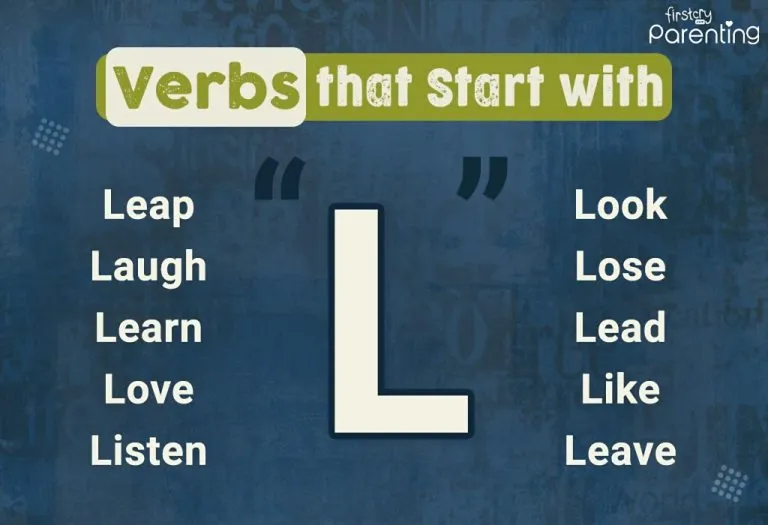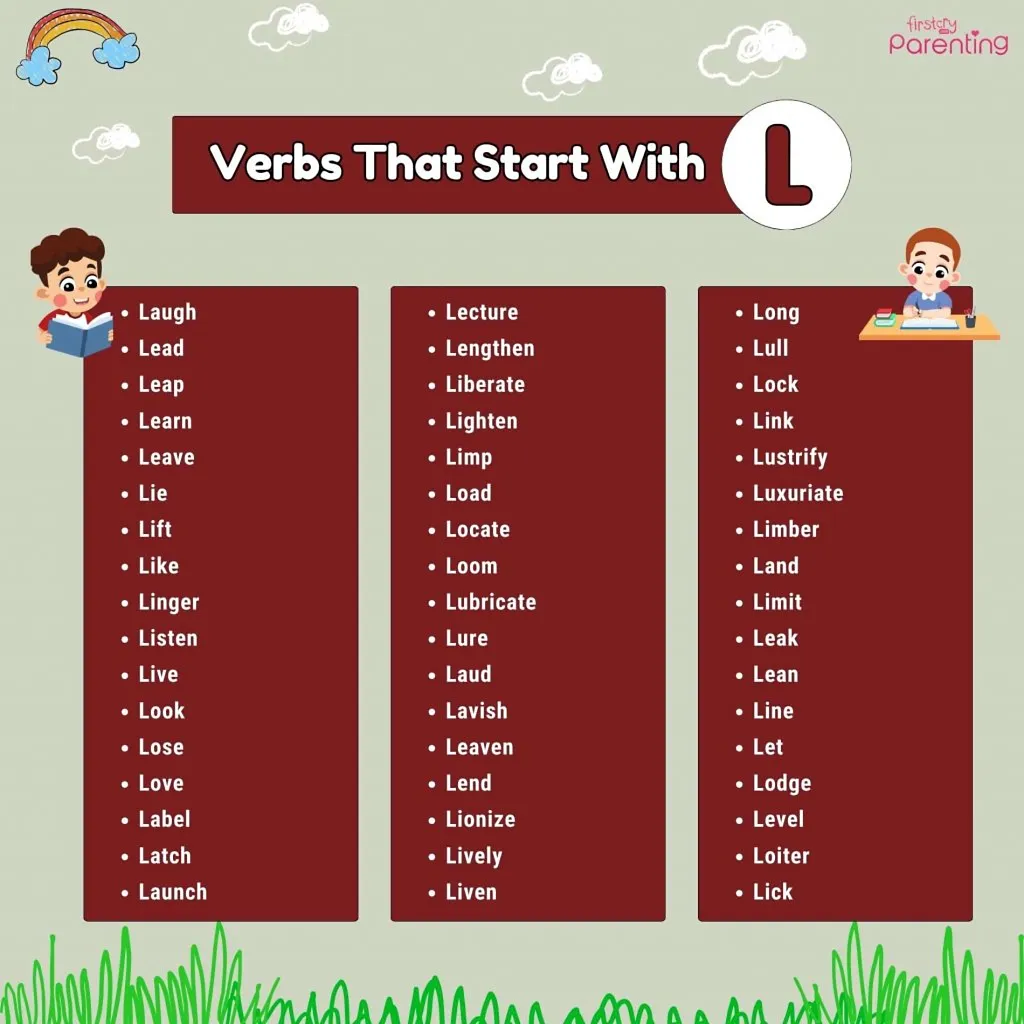Verbs That Start With L in English (With Meanings & Examples)
Welcome to the charming world of English vocabulary, where each letter holds a treasure trove of words that light up our conversations and writings. Today, we’re embarking on a delightful journey into the land of verbs that start with the letter “L”. This exploration is not just any ordinary lexical adventure; it’s a warm, engaging experience specifically designed for the young minds of preschoolers and kids. If you’re a parent, teacher, or guardian looking to enrich your child’s vocabulary, you’ve landed in the perfect spot. Our focus on verbs that start with L for preschoolers and kids aims to provide a fun and educational insight into the vibrant world of English verbs. By introducing these verbs, we’re not just expanding vocabulary for kids. We’re opening doors to new worlds of expression and understanding, all through the magical power of verbs beginning with the enchanting letter “L”. Join us as we dive into meanings examples and the joyful learning that awaits.
What Are the Verbs Beginning With L?
Verbs starting with L are diverse words encapsulating action, state, or occurrence, beginning with the lovely letter “L”. These verbs with L range from simple, everyday actions to more complex processes, each playing a unique role in communicating and describing the world around us. These verbs add vibrancy and depth to our language, whether “laugh” to express joy or “learn” to gain knowledge.
Common Verbs Starting With L
This section will explore a selection of common English verbs starting with “L.” These verbs are essential for expressing various actions and states in English.
1. Laugh
To express amusement or joy with sounds and facial expressions.
Example: The children couldn’t help but laugh at the clown’s antics during the circus performance.
2. Lead
To guide, direct, or influence others in a particular direction or action.
Example: Martin Luther King Jr. lead the civil rights movement with courage and conviction.
3. Leap
To jump or spring a long way, to a great height, or with great force.
Example: The athlete leapt over the hurdle effortlessly, showcasing remarkable agility.
4. Learn
To acquire knowledge through study, experience, or being taught.
Example: She was eager to learn new languages and enrolled in a language course at the community centre.
5. Leave
To go away from a place or person.
Example: Don’t leave your belongings unattended in a crowded area.
6. Lie
To recline or be in a horizontal position on a surface.
Example: After a long day at work, he just wanted to lie down and rest his weary body.
7. Lift
To raise to a higher position or level; to move upwards.
Example: With a loud grunt, he lifted the heavy box off the ground and onto the table.
8. Like
To find something enjoyable, agreeable, or satisfactory.
Example: She likes to relax by reading a good book in her favourite armchair.
9. Linger
To stay in a place longer than necessary, typically because of reluctance to leave.
Example: She lingered at the park, savouring the last moments of daylight.
10. Listen
To pay attention to sound, to hear something with thoughtful attention.
Example: Please listen to the instructions before starting the experiment.
11. Live
To be alive to exist.
Example: The endangered species struggled to live in their rapidly shrinking natural habitat.
12. Loathe
To feel intense dislike for someone or something.
Example: She loathed the idea of having to work overtime on weekends.
13. Look
To direct gaze in a particular direction or at something, to observe or examine.
Example: She looked out the window and admired the beautiful sunset, painting the sky in hues of pink and orange.
14. Lose
To be deprived of or cease to have something due to an action or misfortune.
Example: The team knew they couldn’t afford to lose the match if they wanted to advance to the finals.
15. Love
To have a strong affection or deep romantic or sexual attachment for someone or something.
Example: He loved his grandmother dearly and visited her every weekend without fail.
This concludes our exploration of common verbs starting with L, encompassing a range of actions and states in the English language.
Action Verbs That Start With L
This section will delve into various action verbs that start with the letter “L.” These verbs depict physical or mental actions and are essential for constructing dynamic sentences.
1. Label
To attach a label to something to identify or describe it.
Example: She carefully labelled each box with its contents to make unpacking easier when they arrived at their new home.
2. Lament
To express sorrow, mourning, or regret for something.
Example: The villagers lamented the loss of their crops due to the drought.
3. Latch
To fasten or secure something with a latch or similar device.
Example: Please latch the gate securely to prevent the dog from escaping.
4. Launch
To set or propel something into motion or activity.
Example: The company plans to launch a new product line next month to capture a larger market share.
5. Lecture
To give a talk or presentation to an audience, typically for educational or instructional purposes.
Example: The professor plans to lecture on climate change during the next class session.
6. Lengthen
To make or become more extended or more significant in extent.
Example: The days start to lengthen as we move into spring, providing more daylight hours.
7. Liberate
To free someone or something from a situation, especially imprisonment or oppression.
Example: The soldiers fought bravely to liberate the captive civilians from the enemy’s control.
8. Lighten
To make or become lighter in weight or brightness.
Example: Opening the curtains will lighten the room and make it feel more spacious.
9. Limp
To walk with difficulty, typically due to injury or weakness.
Example: After spraining his ankle, he limped back to the campsite.
10. Liquidate
To convert assets into cash by selling them.
Example: The company had to liquidate its remaining inventory to cover its debts and close the business.
11. Load
To put a heavy burden or quantity of something on or in something.
Example: He carefully loaded the moving truck with boxes of belongings, making sure everything fit securely.
12. Locate
To find or determine the exact position of something.
Example: It took them hours to locate the missing keys, but they eventually found them under the sofa.
13. Loom
To appear as a shadowy form, especially large or threatening.
Example: Dark clouds loomed over the horizon, signalling an impending storm.
14. Lubricate
To apply a substance such as grease to reduce friction or wear.
Example: It’s essential to regularly lubricate the door’s hinges to prevent them from squeaking.
15. Lure
To attract or entice someone or something to go somewhere or to do something.
Example: The scent of freshly baked cookies lured her into the kitchen despite her resolve to stick to her diet.
This selection encompasses various action verbs starting with L, each contributing to the richness and dynamism of the English language.
Positive Verbs That Start With L
In this section, we’ll explore a collection of positive verbs that begin with the letter “L.” These verbs convey actions associated with positivity, growth, and well-being, adding a bright touch to communication.
1. Laud
To praise highly; to extol.
Example: The critics lauded the director’s innovative approach to film-making.
2. Lavish
To bestow generous amounts of something, such as attention, affection, or praise.
Example: The host lavished her guests with compliments and delicious homemade treats during the party.
3. Leaven
To add a lightening or enriching element to something.
Example: Her sense of humour leavened the seriousness of the meeting, making it more enjoyable for everyone.
4. Legitimise
To make legitimate or acceptable according to rules or standards.
Example: The new regulations helped to legitimise the use of renewable energy sources.
5. Lend
To offer something, typically assistance or support, to someone in need.
Example: He’s always willing to lend a helping hand to his neighbours whenever they require assistance.
6. Lionise
To treat someone as a celebrity or as highly important.
Example: The town often lionises its local heroes with parades and celebrations.
7. Lively
To make lively or full of life.
Example: The vibrant street performers livelified the city square, attracting crowds with their music and dance.
8. Liven
To make something more energetic, vibrant, or lively.
Example: The live band’s performance livened up the atmosphere at the party, getting everyone on the dance floor.
9. Long
To desire or yearn for something with great intensity and persistence.
Example: He longs for the day when he can travel the world and explore different cultures.
10. Lull
To soothe or calm someone into a state of tranquillity or relaxation.
Example: The gentle sound of rain lulled him into a peaceful sleep.
11. Lullaby
To sing a soothing song to someone, typically a child, to help them fall asleep.
Example: The mother lullabied her baby with a gentle melody, calming him into a peaceful slumber.
12. Luminesce
To emit light, to shine.
Example: The fireflies luminesced in the darkness, creating a magical glow in the forest.
13. Lustrate
To purify or cleanse spiritually.
Example: The ceremony was meant to lustrate the souls of the participants, bringing them peace and renewal.
14. Lustrify
To make bright or shiny; to polish.
Example: The jeweller lustrified the diamond ring, enhancing its brilliance and sparkle.
15. Luxuriate
To take great pleasure or delight in something, especially when it involves indulgence or relaxation.
Example: After a long work week, she luxuriated in a hot bubble bath and soft music.
These positive verbs, beginning with L, serve to uplift conversations and interactions, fostering warmth, connection, and optimism.
More Verbs That Begin With L
In this section, we’ll continue exploring verbs that start with the letter “L,” encompassing a diverse range of actions and expressions. These verbs add depth and nuance to communication, allowing for precise and engaging language use.
| Verbs | ||
| Lacerate | Limber | Laminate |
| Land | Limit | Lather |
| Lacquer | Line | Leak |
| Loot | Lisp | Lean |
| Libel | Litigate | Legislate |
| Lampoon | Lunge | Let |
| Languish | Lodge | Level |
| Lard | Loiter | Levitate |
| Lark | Loil | Lick |
| Lash | Lynch | Link |
| Levy | Loop | Lock |
| Lurk | Loped | Lower |
| Leverage | Lauded | Leapfrog |
| Loosen | Lithe | Lute |
| Localise | Lace | Line-up |
| Lessen | Lack | Lige |
| Lease | Lag | |
FAQs
1. What are some common verbs starting with the letter “L”?
Common verbs starting with “L” include “laugh,” “learn,” “love,” “listen,” and “look.”
2. How can I improve my vocabulary with verbs starting with “L”?
You can improve your vocabulary by regularly using verbs like “lament,” “lure,” “liberate,” “lubricate,” and “lengthen” in your writing and conversations.
Also, Discover the Verbs That Start With A to Z
| Aim | Notice |
| Believe | Open |
| Connect | Paint |
| Dream | Quiet |
| Enjoy | Reach |
| Forgive | Succeed |
| Gather | Travel |
| Heal | Unite |
| Imagine | Value |
| Join | Win |
| Know | X-ray |
| Love | Yearn |
| Motivate | Zoom |
Exploring verbs beginning with the letter “L” offers a rich array of expressions to enhance communication and articulate actions and states. From positive actions like “laughing” and “loving” to more nuanced actions such as “lamenting” and “liberating,” these verbs contribute to the vividness and depth of language. By incorporating these verbs into daily communication, individuals can enrich their vocabulary and express themselves with greater precision and flair.
Also Read: Verbs That Start With A to Z
| A | B | C | D | E | F | G | H | I | J | K | L | M |
| N | O | P | Q | R | S | T | U | V | W | X | Y | Z |
Was This Article Helpful?
Parenting is a huge responsibility, for you as a caregiver, but also for us as a parenting content platform. We understand that and take our responsibility of creating credible content seriously. FirstCry Parenting articles are written and published only after extensive research using factually sound references to deliver quality content that is accurate, validated by experts, and completely reliable. To understand how we go about creating content that is credible, read our editorial policy here.














.svg)
















